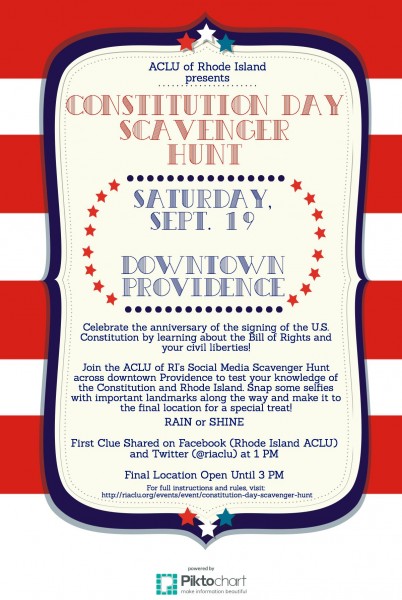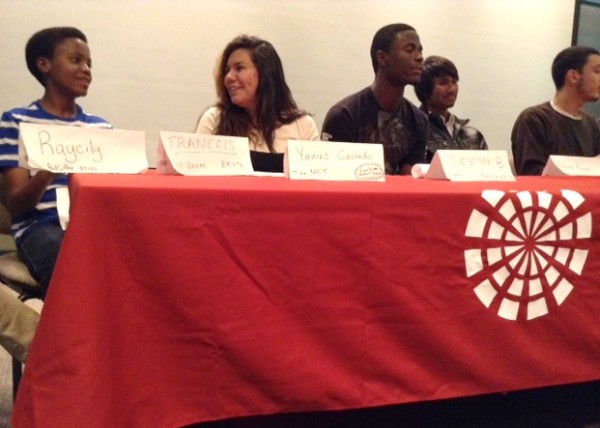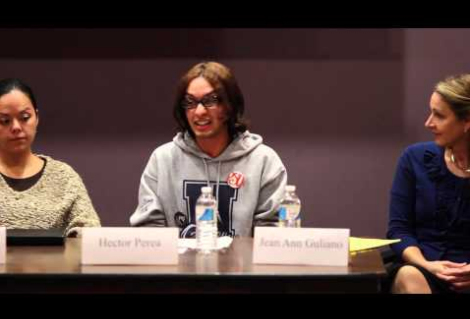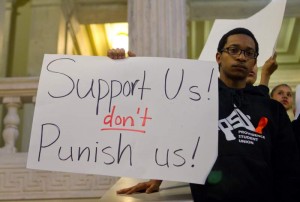 As the state’s strongest defender of your rights and freedoms, the ACLU of Rhode Island is excited to announce our plans to celebrate Constitution Day this week by hosting a family-friendly scavenger hunt highlighting Providence’s civil liberties history. Constitution Day marks the anniversary of the signing of the United States Constitution on September 17, 1787. Americans across the country observe the anniversary by teaching students about the Constitution and Bill of Rights. This year, the ACLU of Rhode Island is hosting a Constitution Day Scavenger Hunt on Saturday, September 19, to teach Rhode Islanders of all ages about civil liberties and local history.
As the state’s strongest defender of your rights and freedoms, the ACLU of Rhode Island is excited to announce our plans to celebrate Constitution Day this week by hosting a family-friendly scavenger hunt highlighting Providence’s civil liberties history. Constitution Day marks the anniversary of the signing of the United States Constitution on September 17, 1787. Americans across the country observe the anniversary by teaching students about the Constitution and Bill of Rights. This year, the ACLU of Rhode Island is hosting a Constitution Day Scavenger Hunt on Saturday, September 19, to teach Rhode Islanders of all ages about civil liberties and local history.
The family-friendly scavenger hunt will highlight Providence’s civil liberties history, and we hope the event educates the public, and especially children and teenagers, about the Bill of Rights and importance of knowing one’s rights.
So, think you know your Rhode Island history? Want to learn how the Constitution applies to everyday life? Put on your walking shoes and head to downtown Providence on your own or with your friends and family on Saturday, September 19, to start the hunt!
We’ll start sharing clues on our Facebook and Twitter at 1 p.m. (Rain or shine). Use them to start a self-guided hunt for landmarks around the city. Once you arrive at a stop, snap a photo (selfies are encouraged!) and share it on Facebook or Twitter with the hashtag #ConstitutionHunt. Make it to the final location to earn bragging rights and a small souvenir.
Constitution Day Scavenger Hunt
(RSVP On Our Facebook Page Here)
Saturday, September 19
1 to 3 P.M.
Downtown Providence
For more information and official rules, click here.
]]>
Last week, more than 60 local students marched in circles around City Hall holding signs that read, “Keep Your Promise,” and “My Feet Hurt.”
The Providence Student Union (PSU) organized the action in protest of Mayor Elorza’s failure to follow through on his campaign promise regarding school transportation to “bring the walking limit to 2 miles, and to grant bus passes to anyone who lives beyond that.” Currently, Rhode Island Public Transit Authority (RIPTA) passes only extend to students living farther than 2.5 miles from school. This 2.5 mile radius came after a reduction from a 3 mile radius by former Mayor Angel Taveras via the inclusion of additional funding in the 2014-15 budget, with plans for further reduction of the radius in the 2015-2016 school year. As WPRI reports, as “Elorza and school officials scrambled to close a projected $34.7-million shortfall in the budget year that begins July 1, the $680,000 needed to reduce the distance to two miles was deemed too steep.”
PSU organizer Roselin Trinidad, in an interview with NBC 10’s Bill Rappleye, stated, “Kids have actually told me I’d rather stay at home than walk in the snow because I’m safe. I know I’m not going to slip on the sidewalk. I know I’m not going to get frostbite because I’m home.” And she continued, “the sidewalks are not well plowed, so it forces me to walk on the street. I’ve been lucky so far.” Indeed, the need for a solution to this massive lack of transportation for students who live substantial distances from their schools is incredibly palpable after this past winter, when the unplowed and unsalted sidewalks became dangerous.
It’s a predicament that I myself can relate to: while I don’t attend public school in town, I live exactly 2.5 miles from Brown’s campus where I go to teach and attend classes, and I often walk the distance. Here is the crucial difference: if I get a blister, or my feet hurt, or I’m just exhausted, or there has been a blizzard, I have the option of either taking the bus (which is paid for), getting a ride from my partner, taking a Brown-provided safeRIDE, or driving in my sometimes-functional car. When the streets were at their worst this winter, I walked to campus as little as possible, because I didn’t feel safe walking down the slippery sidewalks, or, worse, down the middle of the street because the sidewalks were too icy or completely unshoveled. Again, I live 2.5 miles from campus, which is relatively far, regardless of whether the city thinks this is a reasonable distance for high school students to walk. I fell one of the few times I did walk this winter, and I heard many stories of fellow students, a number of whom lived much closer to campus, who fell multiple times, often getting injured or bruised in the the process. If Brown students with access to multiple forms of transportation are having trouble getting to school, it is absurd that high school students being asked to make such long treks without access to public transit.
Indeed, the 2 mile mark is not enough, and this seems especially true when the weather turns sour. I say this not solely as a Brown student, but as someone who has attended 8 different public institutions across the grade spectrum, including several public colleges, all of which provided better access to transportation than Providence currently provides its students.
As Elorza himself said while campaigning, “denying students who live between 2-3 miles away from school bus passes impacts learning, impacts health, and impacts safety, and our low-income communities are disproportionately affected.”
Roselin Trinidad’s response as quoted in Bob Plain’s recent RIFuture article seems apt: “Mayor Elorza pledged that the City would put money in next year’s budget to lower the walking distance for Providence high school students down to 2 miles. Yet his proposed budget does not direct a single dollar toward keeping this promise. It is unacceptable for Mayor Elorza to value our ability to access education before an election, but not after, and we will not quiet down until this wrong has been righted.”
Is there a way to make bussing more sustainable? Can bus passes have some form of nominal fee attached to them that is tiered much like many free or reduced price student meal programs in order to make the program budget-friendly in a way that opens it to students up to the 1.5 or 1 mile mark (according to an RIFuture article from 2014, over half of Rhode Island school districts provide transportation for students living within 1.5 miles, and almost a third of districts provide transportation to students living beyond the 1 mile mark)? Is there a way to expand this program to more students when the weather turns sour for months on end? Can schools do anything in the interim to help students get to their classes like school organized car-pooling?
I think this issue needs to be looked at seriously, and just reducing the limit to 2 miles, while a necessary first step, also leaves many other students still in precarious positions, especially if the city experiences another winter like this last one. Providence’s utter neglect evokes one of those “back in my day” stories where a grandparent describes walking uphill, through the snow both ways, to school. Except the city’s current students experience such ridiculous slogs on a daily basis. Except now, when the the students do get to school, the buildings are often crumbling. Seriously, Providence can do better.
]]> Past and present Providence public school students spoke at Brown University Thursday night about the difficulties they face in their determination to do well, attend college, and “elevate” themselves and their families out of poverty. They spoke of good teachers, bad teachers, and resource inequality.
Past and present Providence public school students spoke at Brown University Thursday night about the difficulties they face in their determination to do well, attend college, and “elevate” themselves and their families out of poverty. They spoke of good teachers, bad teachers, and resource inequality.
“It’s not the teachers’ fault and it’s not the students’ fault,” said Raycily Castillo, who attends the Paul Cuffee School. “It’s where they come from, what’s going on in their homes. No matter how good it is at school, they all have to go back home every day and face a wave of negativity.”
Francois Nduwumwami, from Del Sesto Middle School, added, “Children these days are failing school because of depression.” Mental health crises such as self-mutilation, he said, are common, even at the middle school level.
The panelists’ engagement in extra-curricular programs as well as their obvious pride in being from families who are supportive of their educations, set them somewhat apart from the majority of the city’s students, but they were clearly concerned about their peers and eager to offer advice about how to help more students.
Garren Jansezian, a graduate of E Cubed and now a freshman at URI, emphasized the need for teachers to know their students and care about them. “Advocate, advocate, advocate!” was his immediate response. But he also observed that there needs to be a societal shift in the way families do and do not support their children’s educations: “Parents’ impact on kids is so huge.” He talked about his own personal history with very young parents and how that made life challenging for all of them.
Several of the panelists addressed the difficulty of getting urban students involved in programs that would benefit them. Central High School student Destin Bibimi’s advice was to “get students you’re already working with to talk to their friends.”
“Food helps,” said Sidi Wen, from Classical High School. “Just say, ‘I’m gonna be there, pizza’s gonna be there, you should be there!'”
“We kids are really hungry,” Garren added. “Many of us go home to empty cupboards, especially the last few days of the month when the family is just trying to make ends meet. Snacks are so important. If you don’t eat, you can’t do homework.”
The panelists said they wanted teachers who care enough to build individual relationships with them, who are passionate about their subject and are well-prepared. Teachers need to know how to control their classroom, make the subject interesting to the students, and have faith that each and every student can learn.
The controversy over high-stakes standardized testing came up briefly. Garren, whose senior project last year was on the effects of income inequality on test scores, was strongly opposed. He cited as reasons for his opposition the difference in family resources, the cultural bias in standardized test questions, and the degradation of education in urban schools as a direct result of the high-stakes testing. “Teachers continuously teach to the test,” he said. You may pass the test, but then you go off to college and flunk out because you’re not prepared.”
The nine panelists are participants in Brown University student-originated programs that work in Providence middle and high schools: The RI Urban Debate League, Generation Citizen, Providence Student Union, and BRYTE (Brown Refugee Youth Tutoring and Enrichment).
“While this event is the brainchild of the coordinators (of the four programs), Ashley Belanger, of the RI Urban Debate League, said, “the Swearer Center has encouraged and supported us throughout the planning of the panel. The Swearer Center, Brown University’s center for public service, has increasingly encouraged (Brown’s) students to take an interest in the city in which they live. I think that the Rhode Island Urban Debate League, Brown Refugee Youth Tutoring and Enrichment, Generation Citizen, and the Providence Student Union are all evidence of the increased engagement.”
]]> For those who wonder what is really going on in those big old high schools in Providence, Brown University is hosting a discussion about them Thursday, featuring as speakers the very students who experience or have experienced them on a daily basis.
For those who wonder what is really going on in those big old high schools in Providence, Brown University is hosting a discussion about them Thursday, featuring as speakers the very students who experience or have experienced them on a daily basis.
It begins at 6:30 p.m. in the Salomon Center for Teaching, Room 001, the College Green. Twelve current and former high school students from Central, Classical, Hope, Alvarez, E-Cubed Academy, The Met and Paul Cuffee, will contribute their perspectives on a number of issues confronting their schools, such as their schools’ reputations, graduation and college admission rates, what students are offered for lunch, and what they believe makes a great teacher.
There will be a half hour of facilitator-generated Q&A and then 45 minutes of interactive audience Q&A. The discussion is sponsored by Generation Citizen, BRYTE, Providence Student Union, and the Rhode Island Urban Debate League.
]]> A report issued by the ACLU of Rhode Island today shows that Rhode Island’s public schools last year disproportionately suspended black students at the highest rates in nine years, while white students were suspended at record low rates. Like black children, Hispanic students remained severely over-suspended, with these disparities reaching all the way to the lowest grades. In addition, students generally – including elementary school children – were given out-of-school suspensions at alarming rates for minor disciplinary infractions.
A report issued by the ACLU of Rhode Island today shows that Rhode Island’s public schools last year disproportionately suspended black students at the highest rates in nine years, while white students were suspended at record low rates. Like black children, Hispanic students remained severely over-suspended, with these disparities reaching all the way to the lowest grades. In addition, students generally – including elementary school children – were given out-of-school suspensions at alarming rates for minor disciplinary infractions.
The report, “Blacklisted: An Update,” is a follow-up to one the ACLU issued last June, which examined eight previous years of suspension data. That report also documented and explored the dangers of out-of-school suspensions and the disproportionate impact of suspensions on black and Hispanic youth, but the latest statistics demonstrate that the inappropriate and discriminatory use of out-of-school suspensions – even at the elementary school level – continues unabated across Rhode Island.
Among the findings from a review of data from the 2012-2013 school year:
- Black students were suspended from school 2.19 times as often as would be expected based on their school population. This is a record high suspension disparity for black students over the nine years the ACLU has studied. Hispanic students were suspended over one-and-a-half times as often as expected. White students, in contrast, were suspended just 0.64 times what would be expected, a record low.
- Twenty-five school districts disproportionately suspended black students. Twenty-six school districts disproportionately suspended Hispanic students.
- Suspensions remained endemic at the lowest grades, and continued to disproportionately affect minority students. Nearly 1,400 elementary school students – and 147 first grade students – were suspended last year, and black elementary school students were suspended more than three times as often as expected based on their representation.
- Despite nationwide efforts to promote the use of out-of-school suspensions only in extreme circumstances, over 60 percent of the suspensions for Rhode Island students last year were for low-risk behavioral infractions.
- One-third of all suspensions were served for the vague infractions of “Disorderly Conduct” and “Insubordination/Disrespect.” In fact, thousands more suspensions occurred for “Disorderly Conduct” and “Insubordination/ Disrespect” than for assault, bomb threats, breaking and entering, possession or use of controlled substances, fire regulation violations, fighting, gang activity, harassment, hate crimes, hazing, larceny, threats, trespassing, vandalism or weapon possession combined.
- More than a quarter of elementary school suspensions were for “Disorderly Conduct” alone. Despite making up one-third of the elementary school population, black and Hispanic students constituted two-thirds of the elementary school students suspended for “Disorderly Conduct” or “Insubordination/Disrespect.”
- Although the total number of suspensions overall was down from previous years, that reduction can be attributed almost exclusively to implementation of a law passed by the General Assembly in 2012 prohibiting out-of-school suspensions for attendance infractions. In fact, while overall suspensions decreased, the number of suspensions for low-risk behavioral infractions increased by more than 400.
The report concluded: “Rhode Island’s students deserve an education system that seeks to promote rather than punish them, and efforts by educators and the legislature in 2014 can make that possible. Swift action by Rhode Island’s leaders can ensure that another cohort of children does not find themselves the subject of increasingly grim statistics, and instead finds them granted all the educational opportunities we have to offer them.”
In finding little change from the eight years’ worth of statistics analyzed in its last report, the ACLU reiterated a series of recommendations for policy-makers to address this serious problem. Among the ACLU’s recommendations this year: the General Assembly should approve legislation limiting the use of out-of-school suspensions to serious offenses; school districts should examine annually their discipline rates for any racial or ethnic disparities, and identify ways to eliminate them; schools should ensure that punishments are clearly and evenly established for various offenses; and the state Department of Education should investigate and promote the use of alternative evidence-based disciplinary methods.
]]>
While it is great that so much emphasis is being placed on the misuse of NECAP testing there is much more that needs to be looked at regarding how our present youth population is treated by the education system.
Recent studies indicate that nearly 1 in 5 school aged youth are taking prescription medications. In addition, the abuse of medications like Adderall, Klonopin and Oxycontin has resulted in a number of kids becoming addicted, going to jail and/or overdosing (sometimes death resulting).
I point this out because being a young person today is proving to be more stressful than for the last generation. Sure, each era has its concerns, but for today’s kids the pace of the world is often difficult to keep up with.
In trying to keep up with the tests, extra school requirements, after school activities, friends, navigating through cyberspace, parents etc., etc. some young people either shut down or are given medications to keep up. In an odd way a Cottage Industry has been created – benefiting testing companies, pharmaceutical manufacturers, psychiatrists and so-called education reformers.
While all of this goes on, kids are being exploited and miseducated. With little emphasis on applicability, today’s education system is oftentimes perfunctory. Even kids who ‘keep up’ are cheated. For those who struggle it is remediation, medication, dropping out, counseling and/or a feeling of failure.
We are creating an alienation factory. Too many are prescribed powerful medications so they can remain on the conveyor belt.
There is much more to the NECAP story than just the test. Where once child development was central to how we taught kids – test scores have become the major player. Where once Piaget, Erikson, Gardner and Montessori were discussed, young students are now educated as if in a Dilbert episode.
Addressing the importance of the NECAP is essential. However, doing so is only a part of the battle. The stress being placed on today’s youth is enormous. Somehow we have to step back and look at this.
I am amazed that we are allowing this all to occur under our noses. There are school officials afraid to speak for fear of losing their jobs. There are politicians supportive of all of this reform stuff because it can be supposedly measured by tests. In the end the kids pay the heaviest price. Years from now many will wish they had spoken up.
]]>